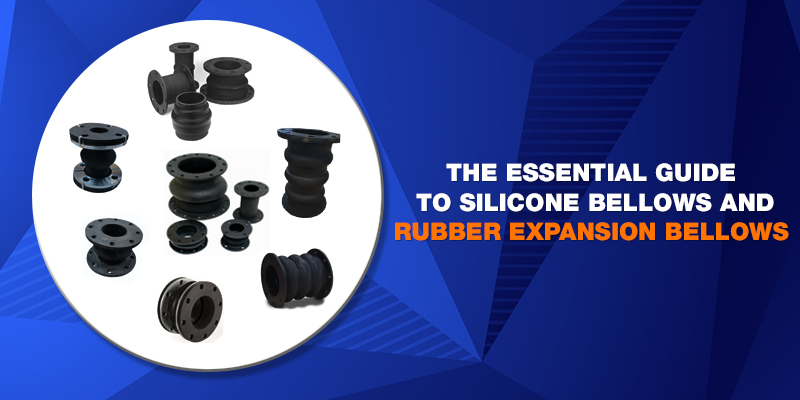The Essential Guide To Silicone Bellows And Rubber Expansion Bellows

Silicone Bellows and rubber expansion bellows are both vital components in a wide range of industrial applications. They offer a flexible solution for managing movement, vibration, and pressure changes within a system. Understanding the differences and specific uses of each type of bellow is crucial for selecting the right one for your needs.
Silicone Bellows: Flexibility and Biocompatibility
These Silicone bellows are manufactured from silicone rubber, a versatile elastomer known for its exceptional flexibility, heat resistance, and biocompatibility.
Flexibility: These bellows can expand and compress significantly, making them ideal for applications requiring a high degree of movement accommodation. This flexibility allows for misalignment between connected components and absorption of vibration, reducing stress on the system.
Heat Resistance: These bellows offer excellent resistance to high temperatures, typically ranging from -75°C to +250°C. This makes them suitable for use in demanding environments with hot fluids or gasses.
Biocompatibility: Certain grades of silicone are biocompatible, meaning they can be safely used in medical devices and food processing applications. This biocompatibility ensures the material won't leach harmful chemicals or react negatively with biological tissues.
Applications:
Medical Devices: These bellows are commonly found in medical pumps, catheters, and drug delivery systems, where their flexibility and biocompatibility are crucial.
Food Processing: The ability to withstand high temperatures and meet food-grade standards makes bellows ideal for use in food processing equipment, such as pumps and mixers.
Pharmaceutical Industry: Similar to the food processing industry, silicone bellows find application in pharmaceutical equipment due to their heat resistance and biocompatibility.
Electronics Industry: These bellows can be used in electronic enclosures to provide flexibility and protect delicate components from vibration and temperature fluctuations.
Here's an example of a company specializing in silicone bellows: Custom Rubber Bellows offers a wide range of silicone bellow designs and configurations to meet various application needs.
Rubber Expansion Bellow: Durability and Pressure Management
Rubber Expansion bellow is made from various elastomers like neoprene, nitrile, or EPDM, each offering specific properties for different applications.
Durability: These bellows are known for their excellent durability and ability to withstand harsh environments. They are resistant to many chemicals and can handle high pressures.
Pressure Management: These bellows are designed to accommodate pressure fluctuations within a system. They can absorb pressure surges and prevent damage to rigid piping or equipment.
Applications of Rubber Expansion Bellows:
Plumbing and HVAC Systems: Rubber expansion bellows are widely used in plumbing and HVAC systems to absorb thermal expansion and contraction of pipes, preventing leaks and stress on connections.
Industrial Processes: They are crucial components in various industrial processes involving the transfer of fluids, gases, or slurries at high pressures. They help absorb vibration and pressure fluctuations, protecting piping and equipment.
Automotive Industry: These bellows are used in automotive engines and exhaust systems to accommodate thermal expansion and vibration.
Choosing the Right Rubber Bellows Expansion Joint
Selecting the appropriate rubber bellows expansion joint for your application requires careful consideration of several factors:
Pipe Size and Pressure Rating: The size of the bellows and its pressure rating must be compatible with the size and pressure of the piping system.
Temperature Range: The chosen elastomer material needs to withstand the expected operating temperature range of the system.
Movement Requirements: The bellows must be able to accommodate the anticipated thermal expansion, vibration, and misalignment within the system.
Media Compatibility: The elastomer material must be chemically resistant to the fluid or gas flowing through the pipes.
Custom Solutions
For specific applications or unique requirements, companies like Custom Rubber Bellows offer custom-designed single bellow rubber expansion joint. These can be tailored in terms of size, material composition, pressure rating, and reinforcement features to ensure optimal performance in your specific system.
Conclusion:
Silicone bellows and expansion bellows rubber are both valuable tools in various industrial applications. Understanding their specific properties and applications will help you select the right type of bellow for your needs. Whether you require the flexibility and biocompatibility of silicone or the durability and pressure management of rubber, these bellows offer reliable solutions for managing movement, vibration, and pressure within your system.
Discuss your Requirement with our Experts
670+ clients served, Share your requirement in detail to get accurate quote





